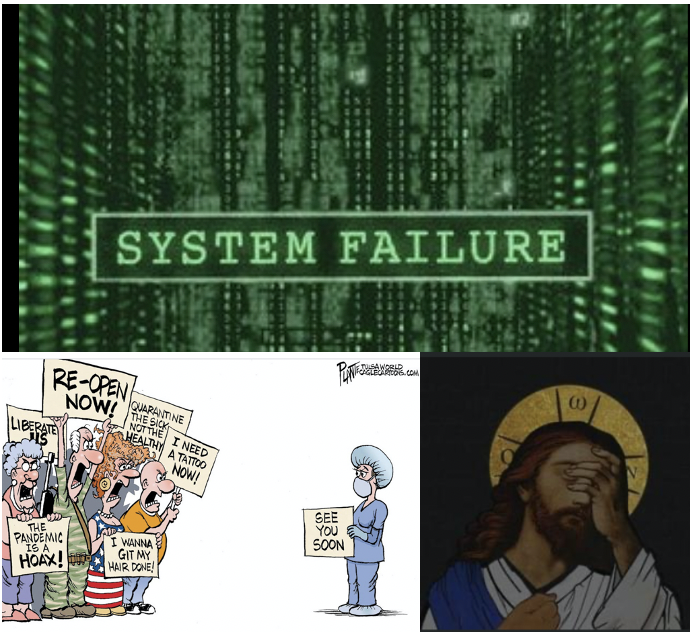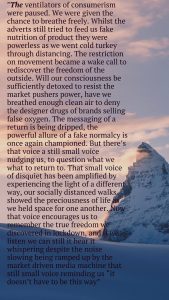 I do think some of the reactions in the USA for me just show how addicted we are, (not just how they are), to a consumerist capitalist system, and I really do think these are signs of system failure. Most of my life we have talked of the shifts from modernity to post modernity to post secularisation and the collapse of our financial system as the consequences of a system where money has become disconnected from the real when we ended the gold standard, and where the system has created economic slavery and an insatiable desire to use the worlds resources beyond what is sustainable and now faces global warming and ecoside.
I do think some of the reactions in the USA for me just show how addicted we are, (not just how they are), to a consumerist capitalist system, and I really do think these are signs of system failure. Most of my life we have talked of the shifts from modernity to post modernity to post secularisation and the collapse of our financial system as the consequences of a system where money has become disconnected from the real when we ended the gold standard, and where the system has created economic slavery and an insatiable desire to use the worlds resources beyond what is sustainable and now faces global warming and ecoside.
The dominance of a culture dictated by Economics now does not make any sense anymore, where the billionaires are forcing political leaders to get people back to work even when their lives are at stake with this virus because they are losing money. For too long now Economics has been more important than human decency and human dignity. We need to own that we are facing a global system failure and it is going to be very painful as predicted by Obama at the beginning of his presidency. My sadness is that many Christians and Churches are so addicted and emeshed into this current market society that they have become part of the problem not the solution. Our model of ‘Church as business’ has been proved impotent in this crisis, with many important pioneers furloughed and now not able to work at a time when we need them more than ever to help and reimagine a church and society in this change. I am convinced that the effects of this virus are part of this system failure, and we have not faced this yet, and the solutions brought in to ride the storm like a universal wage, reductions in activity and destruction of the earth are going to need to part of our future.
There will be no going back, we need to face the future and I am sure that God must look back at some aspects of the Church and weep. I will never understand how some can call themselves Christians with the stances they take which seem to me to have very little to do with the Gospels and Jesus” teachings. We Christians need to play our part in this painful time to face serious change as our global market system collapses, and not be part of the problem. It seems to me some aspects of the church are to deeply emeshed and polluted by ties to the rich and powerful they they have lost their prophetic place as God expected as being the Body of Christ and the visible expression of the invisible Kingdom of God. Give to Caesar what is Caesars and give to a God what is Gods.
Interestingly traditional religious communities with their shared purse and commitment to poverty obedience and chastity can continue as a model of discipleship resistant and counter cultural to our market society and “Church as Business”. This is why I think we need to start to think what does it mean to be a Christian community living out the faith as a rhythm of life and why I am committed to a more new monastic approach to understand how to be a Christian in the context of our changing world where I am seeking not to collude with a system in failure but live simply and seek to hold onto Jesus’ teachings concerning social, economic and ecological justice. May be the solution is that we need to do our own spiritual 12 steps to be able to face this. I recently had to face an addiction problem in my life and this has really helped me to face things in a way I have never been able to before. We need to face our own sitting down by the rivers of Babylon, so we can be part of the solution not the problem as the church unfortunately can be.

